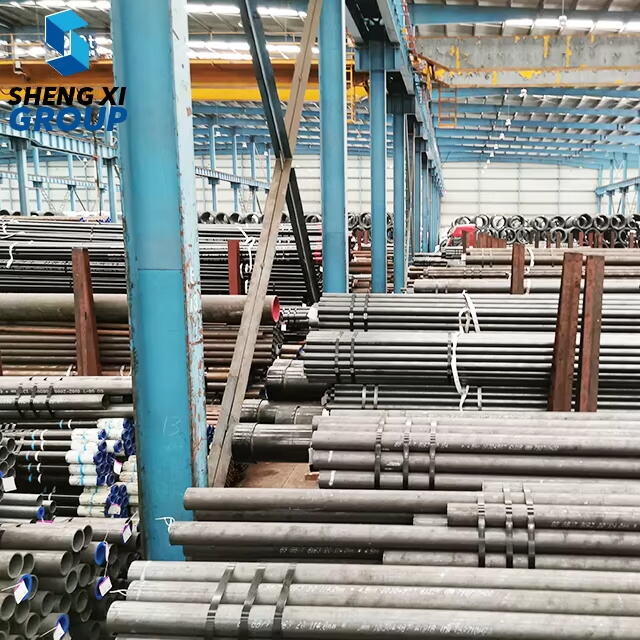Key Factors in Boiler Tube Selection
Material Composition and Durability
Material choice matters a lot when picking out boiler tubes because what they're made from affects how long they last and how well they work. Most people go with carbon steel, alloy steel, or stainless steel options. Each has its own strengths regarding rust protection and structural integrity. Stainless steel stands out for resisting corrosion really well, which makes sense for places where there might be aggressive chemicals around or lots of moisture in the air. Carbon steel tends to be the pick for many applications simply because it conducts heat better and doesn't break the bank as much. The bottom line is that operators need to think about all these factors seriously since different materials mean different lifespans between replacements and varying maintenance schedules. Some plants have seen their maintenance budgets double just by switching from one type to another over time.
Operating Conditions and Thermal Stress
Choosing the right boiler tubes depends a lot on what kind of conditions they'll be working under. Pressure, temperature, and how fast the fluid flows through all matter quite a bit for how well the tubes perform and how long they last. Thermal stress is something engineers need to watch out for because repeated heating and cooling cycles can wear materials down over time. That means looking at how many years the system might run before needing replacement parts when temperatures and pressures keep changing throughout the day. Environmental factors also play their part. Humidity in certain industrial settings or contact with corrosive substances can slowly weaken tube walls even if everything else looks fine on paper. Getting this information straight from site assessments helps technicians pick tubes that won't fail unexpectedly, keeping operations running smoothly while maintaining safe working conditions around high-pressure steam systems.
Evaluating Boiler Tube Materials
Carbon Steel vs. Alloy Steel Options
Selecting the right material for boiler tubes means understanding what separates carbon steel from alloy steel options. Carbon steel remains a go to option because it costs less while still holding up well in most boiler setups. Power generation facilities and factories commonly use carbon steel tubes since they conduct heat efficiently and last through regular wear and tear. But when things get hotter or more corrosive, alloy steel steps in with better protection against both heat damage and chemical attack. The addition of elements such as chromium and molybdenum gives alloy steels extra punch when facing extreme temperatures, which makes them ideal for those tough environments where standard materials would fail. Before making a final decision though, plant engineers typically run tests comparing how each material holds up under stress while also weighing the price tag differences over time.
Stainless Steel and High-Temperature Alloys
Boiler tubes made from stainless steel stand out because they resist oxidation and corrosion so well, which is exactly what's needed in those super hot environments. That's why many chemical plants and power stations rely on stainless steel for their operations. Moving beyond basic stainless options, there are special high temp alloys like Inconel that manufacturers design specifically to handle wild temperature swings and harsh chemical conditions. Inconel itself is basically a mix of nickel and chromium, giving it this amazing toughness that holds up under pressure. The stuff gets used everywhere from jet engines to submarines and even nuclear reactors where failure isn't an option. Sure, getting into these premium materials costs more upfront compared to standard metals. But according to industry data, companies typically see lower repair bills and longer service life from equipment built with them. Most plant managers will tell you that while the price tag looks steep at first glance, these materials pay for themselves many times over during regular operation.
Pressure and Temperature Considerations
Understanding Pressure Ratings
When picking boiler tubes, pressure ratings matter a lot because they set what the system can handle safely. The ASME codes actually spell out pretty detailed specs for this stuff, so engineers know exactly what materials will stand up to normal operating pressures and avoid those nasty explosions nobody wants. Looking at what kind of pressure the system will face day to day is really important too. If the numbers don't match up, things just won't work right over time. Industry stats show that getting pressure ratings wrong accounts for about 30% of all boiler tube failures. That makes sense when we think about how many plants have had to replace entire sections simply because someone overlooked a pressure specification in the first place.
Temperature Limits and Heat Resistance
Knowing what temperatures different materials can handle matters a lot when it comes to getting good performance out of boilers while keeping them safe. Boiler tube materials need to stand up to high heat because this affects how long they last and how well they work overall. Studies show that when materials get pushed past their thermal limits, things start breaking down in operations pretty quickly. That's why picking the right materials for the job based on their temperature capabilities makes all the difference. Boilers run better with fewer breakdowns and stay safer in the long run when operators make smart choices about material selection from the beginning.

Compliance with Industry Standards
ASME and ASTM Certifications
Meeting ASME and ASTM certification requirements plays a key role in maintaining both quality control and safety for boiler tubes across industrial settings. When materials carry these certifications, it means they've gone through extensive testing procedures and meet specific performance benchmarks set by industry experts. Following ASME and ASTM standards helps reduce the chances of boiler tube failures during operation. Industry data shows that businesses which stick to these standards tend to report far fewer problems over time. This pattern makes sense when we consider how standardized testing actually works in practice, providing manufacturers with clear parameters to follow throughout production cycles.
Ensuring Safety and Regulatory Compliance
Safety and following regulations in the boiler business isn't just good practice it's absolutely necessary if we want to keep workers safe and avoid legal trouble down the road. Boiler tubes need to comply with both local rules and international standards if they're going to work properly without putting anyone at risk. Companies should run regular inspections and check components thoroughly to stay compliant. These routine assessments help catch problems early before they become serious issues. When businesses stick strictly to regulations, they protect their employees first and foremost, but they also shield themselves from expensive lawsuits later on. For plant managers and owners alike, regulatory compliance remains one of those non negotiable basics that separates responsible operations from reckless ones.
Cost vs. Performance Analysis
Initial Costs vs. Long-Term Savings
When choosing boiler tubes, looking at what it costs upfront compared to what we save over time matters a lot. The price tag varies quite a bit based on what the tubes are made of and how well they're built. Spending extra money on better quality stuff usually means paying less in the long run for running and maintaining them. Take a good look at all the numbers and many times those bigger initial bills for top notch materials actually work out better because systems run smoother and need fixing less often. Plants that go for the cheapest options just to save money right away tend to run into problems later on with equipment breakdowns and costly repairs down the road. So thinking ahead about these things makes sense for anyone wanting their operations to run smoothly without unexpected costs popping up all the time.
Maintenance Requirements and Lifespan
The amount of maintenance needed for boiler tubes really depends on what materials were used and how well those materials stand up to wear and tear. When companies go for materials that resist wear better, they end up spending less time on repairs, which cuts down costs in the long run. Data collected across different industrial sites shows just how important good maintenance planning actually is. Plants that stick to customized maintenance plans tend to see longer lasting tubes and more stable performance too. Industry pros often stress the importance of checking tube conditions regularly if we want them to last as long as possible. Regular inspections catch small problems early before they turn into big headaches, keeping operations running smoothly while also giving those tubes extra years of service. Getting familiar with these maintenance needs and organizing maintenance work properly makes all the difference in getting the most out of boiler tubes throughout their entire operational life.
Installation and Maintenance Best Practices
Proper Installation Techniques
Getting boiler tubes installed right makes all the difference in avoiding early breakdowns and keeping systems running efficiently for years. When installers follow the correct procedures and specifications, they significantly reduce the chances of problems down the road. Most experts agree that having skilled workers handle the job cuts down on mistakes that can mess up tube alignment or create leaks at connections. Industry data shows that roughly 60% of system issues trace back to poor installation work. That's why many facility managers are willing to pay extra for experienced crews who know what they're doing. Better installation means fewer headaches later on and saves money in maintenance costs over time.
Routine Maintenance for Optimal Performance
Keeping boiler tubes running smoothly requires regular maintenance work, something that saves money in the long run when compared to expensive repair bills later on. When technicians do their routine inspections, they spot small problems before these turn into big headaches down the road. Most equipment makers actually include suggested maintenance timelines in their manuals, and following those guidelines helps stretch out how long the boiler tubes last. Many plants have started using smart monitoring systems lately, tracking usage patterns and warning operators when something might need attention sooner rather than later. These kinds of proactive approaches cut back on wasted energy while making sure everything runs better overall. At the end of the day, sticking with good maintenance habits means longer lasting equipment and fewer interruptions during operations.
FAQ
What are the common materials used in boiler tubes?
Common materials used in boiler tubes include carbon steel, alloy steel, and stainless steel, each offering distinct advantages in corrosion resistance and strength.
How does material composition affect boiler tube selection?
Material composition affects the durability, efficiency, lifespan, and maintenance frequency of boiler tubes, impacting long-term operational costs.
Why is compliance with ASME and ASTM certifications important?
Compliance with ASME and ASTM certifications ensures the quality and safety of boiler tubes, minimizing equipment failure risks in boiler applications.
How can initial costs impact long-term savings in boiler tube selection?
Investing in high-quality materials can result in lower lifetime operating costs, as higher upfront investments often pay off through enhanced efficiency and reduced maintenance needs.
What role does routine maintenance play in boiler tube longevity?
Routine maintenance helps identify potential issues before they escalate, prolonging the life of boiler tubes and ensuring sustained operational effectiveness.
Table of Contents
- Key Factors in Boiler Tube Selection
- Evaluating Boiler Tube Materials
- Pressure and Temperature Considerations
- Compliance with Industry Standards
- Cost vs. Performance Analysis
- Installation and Maintenance Best Practices
-
FAQ
- What are the common materials used in boiler tubes?
- How does material composition affect boiler tube selection?
- Why is compliance with ASME and ASTM certifications important?
- How can initial costs impact long-term savings in boiler tube selection?
- What role does routine maintenance play in boiler tube longevity?


